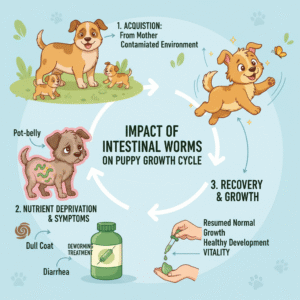PetsCareLab
Puppies that fall behind in their expected growth or appear unusually small for their age are considered stunted. This means something has interfered with their natural growth process or normal development timeline.
Several factors can contribute to stunted growth in puppies, ranging from intestinal parasite infections to inherited genetic traits. In this article, Petscarelab explores the most common causes of stunted growth in puppies and clarifies which concerns genuinely impact their development.
Does Worm Infection Cause Stunting?
One of the primary culprits behind stunted growth in puppies is infection with intestinal parasites like hookworms or roundworms. These worms are incredibly common in puppies across the United States—they often acquire them from their mother or through exposure to contaminated environments. When a puppy harbors a heavy worm infestation, the parasites can consume enough nutrients to significantly hinder the pup’s growth.
Puppies burdened with severe worm infestations usually look unhealthy: they have dull, poor-quality coats, suffer from diarrhea, sport a swollen “pot-bellied” abdomen, and remain small and thin despite having a hearty appetite.
The silver lining is that once the puppy undergoes treatment and clears the worms, their body can recover, and normal growth and development typically resume.
To protect your puppy from intestinal worms, adhere strictly to the deworming schedule recommended by your breeder and veterinarian. If their schedules differ, always prioritize the protocol advised by your veterinarian.
Does Malnutrition Cause Stunting?
A frequent concern among puppy parents is whether switching away from puppy-specific food too early can stunt growth. The straightforward answer is no—you won’t stunt your puppy’s growth by transitioning to adult dog food prematurely or by slightly underfeeding.
Puppy food is specially formulated to support rapid growth and development, but millions of dogs thrive on diets labeled for “all life stages,” which can be safely fed to puppies without adverse effects.
Contrarily, overfeeding or giving supplements during a puppy’s growth phase can cause more harm, potentially compromising long-term joint health. Extensive lifetime studies by leading pet nutrition experts show that dogs kept lean throughout their lives tend to live approximately two years longer and suffer less from chronic illnesses. Consult your veterinarian to determine your puppy’s ideal body condition and get guidance on appropriate feeding amounts.
Like human children, puppies experience growth spurts during their first year of life. Some days, your puppy might need more calories than usual to fuel this rapid development. For example, a 75-pound Goldendoodle might eat two cups of dry food daily as an adult but required up to four cups around eight months of age. Being adaptable with feeding amounts helps support healthy growth.
Another common question surrounds malnutrition and stunting. Extreme cases such as starvation do pose a risk for stunted growth, but puppies raised in loving homes and fed balanced, adequate diets to support bone, muscle, and tissue development typically do not experience stunting, even if they maintain a lean physique.
Does Spaying or Neutering Cause Stunting?
Early spaying or neutering will not stunt your puppy’s growth. However, it can influence the development of joints, particularly in large breed dogs. Research shows that early spay/neuter can delay the closure of growth plates, causing dogs to grow taller than expected. This altered growth pattern may increase susceptibility to joint problems later in life.
This is an important subject to discuss with your veterinarian. For small to medium breeds, the standard recommendation remains spaying or neutering between 6 to 8 months of age. For large breed dogs, however, postponing these procedures until the dog is older can help reduce the risk of joint issues. Female dogs ideally should be spayed after their first heat cycle, while males may benefit from neutering around two years of age.
Always talk to your vet about when to spay or neuter your dog and ask for their reasoning so you can make the best decision for your puppy’s health.
Does Strenuous Exercise Cause Stunting?
Engaging your puppy in strenuous exercise will not stunt growth, but excessive high-impact activities like running may damage the growth plates in their long bones. This damage can cause abnormal bone development and predispose your puppy to joint problems in the future. Large breed puppies are especially vulnerable due to their greater body weight.
Playing fetch or letting your puppy run freely until tired is perfectly fine. However, avoid jogging or running with your puppy until their growth plates have closed. For those planning to have a medium or large breed dog as a running companion, the best advice is to wait until after about 15 months of age to allow bones adequate time to mature.
Are Certain Breeds at Risk for Stunting?
Is any specific breed more prone to stunted growth? There is a rare genetic disorder called pituitary dwarfism, sometimes found in German Shepherds and certain Labrador Retrievers. However, these cases are extremely uncommon and generally not observed in typical companion dogs.









